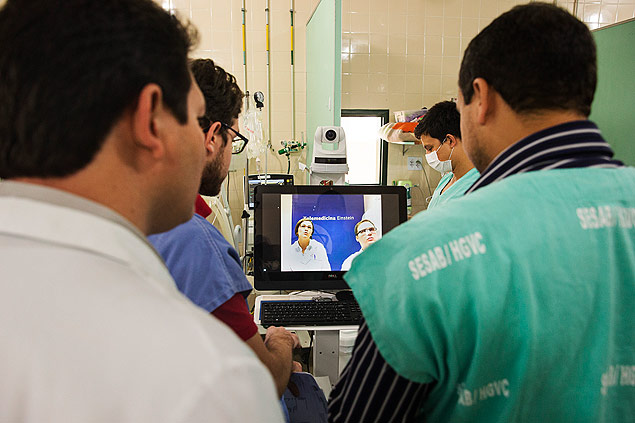Latest Photo Galleries
Brazilian Markets
17h34 Bovespa |
-0,32% | 124.741 |
16h43 Gold |
0,00% | 117 |
17h00 Dollar |
+0,38% | 5,1487 |
16h30 Euro |
+0,49% | 2,65250 |
ADVERTISING
São Paulo Specialists Help Doctors in Bahia in Telemedicine Scheme
08/25/2015 - 08h53
Advertising
CLÁUDIA COLLUCCI
FROM SÃO PAULO
After suffering an accident, A., 32, arrived unconscious at the General Hospital of Vitória da Conquista, in the state of Bahia, with a suspected traumatic brain injury (TBI).
Nearly eight hours later, he had still not undergone a tomography to assess the extent of the damage to his brain, with the equipment at the hospital having been out of order for more than a week.
In addition, the hospital has no catheters to measure the intracranial pressure. "It's expensive. You use it once and then throw it away. Practically inaccessible in the routine of a public hospital," says Miquéas Martins Lima Silva, intensive care physician and coordinator of the hospital's intensive care unit.
In A.'s case, the tomography was taken twelve hours later in another hospital. He was hooked up to a ventilator and transferred by ambulance, returning to the General Hospital of Vitória da Conquista (HGCV) after the assessment.
The HGVC is just one of 15 Brazilian medical institutions that comprise a telemedicine network maintained by a partnership between the Hospital Albert Einstein in São Paulo and the Ministry of Health.
A team of health professionals at the Einstein are available 24 hours a day to provide guidance for the 15 institutions, especially when a second opinion is needed in complex cases such as head traumas, sepsis, strokes and heart attacks.
At the other end, there is a monitor with a camera that can move right up to the patient's bed. In São Paulo, the telemedicine professionals can answer doctors' questions, assess medical exams and even listen to patients' heartrate and breathing. All this 1,439km (894 miles) away, as in the case of Vitória da Conquista.
On the day Folha visited, two cases were discussed, one of which was A.'s. The doctors in Bahia were considering maintaining him sedated, but they wanted to hear an opinion from a neurologist - something hard to come by in the hospital at Vitória da Conquista.
So, they contacted the Einstein neurologist Cristina Massant through WhatsApp, providing her with a report on A.'s condition and the tomography taken the previous night. Massant recommended another tomography 24 hours later, to assess whether the injury to A.'s brain had stabilized.
She also suggested switching one of the drugs A. was receiving for a more expensive alternative. However, the hospital at Vitória da Conquista did not have the drug in stock. Nonetheless, in the following weeks, A. displayed improvement.
There are many obstacles to the introduction of technology in public hospitals, from the chronic lack of resources and training to the reluctance of some health professionals to adopt new practices.
In the hospital at Vitória da Conquista, for example, there are two adult intensive care units, but only one kept the telemedicine connection with the Einstein open, having access to the most up-to-date protocols recommended for patients in critical conditions.
Hospital director Marilene Ferraz Barbosa says that procedures for critical patients will be standardized, including telemedicine, which is used throughout the process, from accident and emergency to intensive care. "This technology greatly improves the quality of the treatment."
For Milton Steinman, coordinator of the Einstein's telemedicine program, the main barriers to the spread of telemedicine in Brazil have been lack of resources and overcrowding in hospitals, combined with resistance to new technologies and lack of connection at some institutions.
In spite of these problems, Steinman sees the program as an important means of improving access to specialists, spreading protocols and implementing policies of quality control and process improvement.
"The idea is to bring a little of the Einstein to each of these hospitals, and in doing so, contribute to a more universal healthcare," he says.
Translated by TOM GATEHOUSE
Read the article in the original language
| Eduardo Knapp/Folhapress | ||
 |
||
| The HGVC comprises a telemedicine network maintained by the Hospital Albert Einstein and the Ministry of Health |



